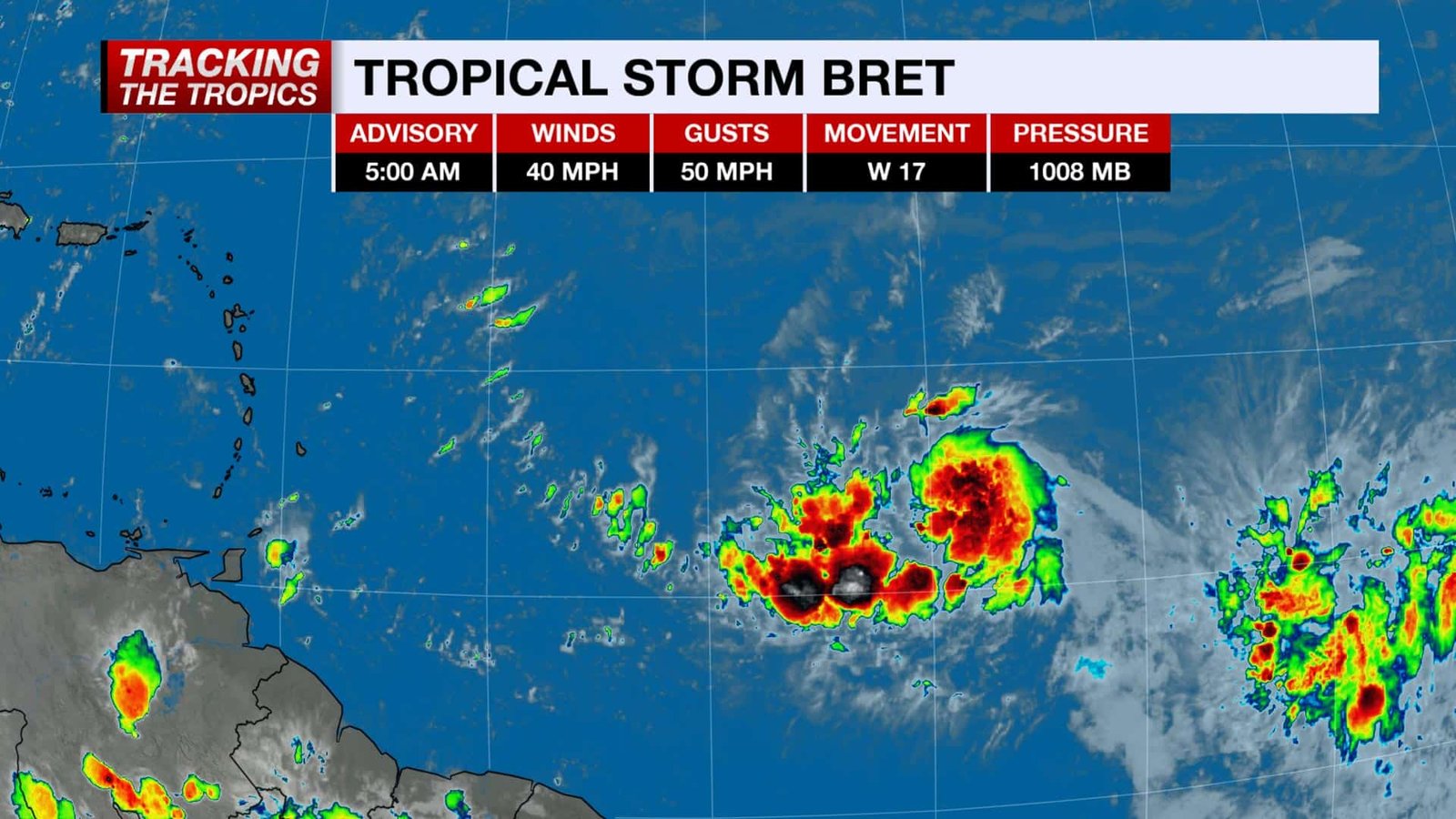Tracking the Tropics: Tropical Storm Bret heading for the Lesser Antilles
As summer approaches and the waters of the Atlantic Ocean start to warm up, meteorologists and weather enthusiasts alike keep a close eye on the tropics. The unpredictable nature of tropical storms and hurricanes makes tracking them a vital task to ensure the safety and preparedness of the communities in their path. One such storm, Tropical Storm Bret, is currently heading towards the Lesser Antilles, causing concern among residents and authorities in the region. In this article, we will delve into the details of this storm, its potential impact, and the precautions being taken to minimize its effects.
Tropical Storm Bret: Formation and Path
Tropical Storm Bret originated from a tropical wave that moved off the African coast in mid-June. As it traveled westward across the Atlantic Ocean, it gradually organized and strengthened, earning the classification of a tropical storm by meteorologists. Currently, Bret is maintaining its intensity and is expected to make its way towards the Lesser Antilles in the coming days.
The Potential Impact on the Lesser Antilles
The Lesser Antilles, a group of islands in the Caribbean Sea, is the primary target of Tropical Storm Bret. Residents in these islands are gearing up for potential impact, as heavy rain, strong winds, and rough surf are anticipated. The storm has the potential to disrupt daily life activities, including transportation, power supply, and communication networks. Furthermore, low-lying areas may face the risk of flooding and landslides, emphasizing the need for adequate preparedness and evacuation plans.
Preparations and Authorities’ Response
Local governments and emergency management agencies in the Lesser Antilles have been closely monitoring Tropical Storm Bret since its inception. They have been issuing regular updates to the public, providing guidance on preparedness measures and evacuation procedures. The authorities are ensuring that essential services, such as healthcare facilities, are adequately equipped to handle potential emergencies. Additionally, they are coordinating with regional and international organizations, such as the Caribbean Disaster Emergency Management Agency (CDEMA), to bolster their response capabilities and resources.
Lessons from Past Experiences
Tropical storms and hurricanes are not new to the Caribbean region. The Lesser Antilles, in particular, has experienced the wrath of many powerful storms, leaving behind a trail of destruction and loss. However, these experiences have provided valuable lessons to both authorities and residents, prompting improved disaster preparedness and response strategies. Through analysis and assessment of past storm impacts, communities have enhanced their ability to predict and mitigate potential risks, thereby reducing the overall impact on lives and infrastructure.
Personal Preparedness: The Individual’s Role
While authorities play a crucial role in responding to tropical storms and hurricanes, individual preparedness is equally important. Residents in the path of Tropical Storm Bret are urged to stay informed about the storm’s progress through reliable sources such as the National Hurricane Center. They should create emergency kits, consisting of essential supplies like non-perishable food, water, medicine, flashlights, and batteries. Moreover, securing loose items and reinforcing homes against strong winds can significantly reduce potential damage.
Community Support and Resilience
During times of crisis, communities come together to support one another and demonstrate remarkable resilience. Neighbors helping each other in preparing their homes, sharing resources, and offering emotional support can have a significant impact on minimizing the effects of tropical storms. Additionally, community organizations and volunteer groups play a crucial role in assisting local authorities in evacuation procedures, providing shelters, and supporting the most vulnerable populations.
Conclusion
Tropical Storm Bret heading towards the Lesser Antilles serves as a reminder of the importance of tracking and preparing for tropical storms and hurricanes. As authorities and communities work together to ensure the safety of residents, it is crucial for individuals to stay informed, be prepared, and contribute to the overall resilience of their communities. Through careful planning, adequate resources, and strengthened response strategies, the impact of tropical storms can be mitigated, enabling affected areas to recover efficiently and minimize the potential loss of life and property.




































